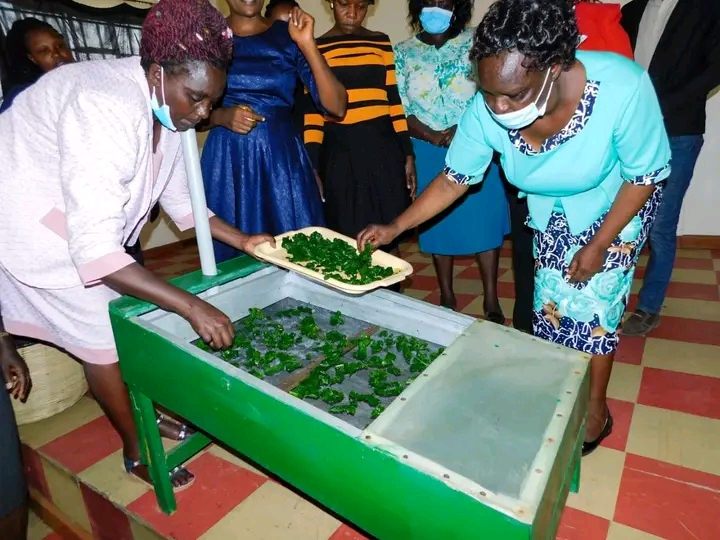The County Government of Nakuru has identified 11,460 vulnerable families that will be facilitated to set up kitchen gardens within the devolved unit in an effort to avert a food crisis following adverse effects of Covid-19 pandemic.
County Executive Committee Member for Agriculture Dr Immaculate Maina, indicated that through the initiative dubbed ‘one million kitchen garden projects’, the beneficiaries will receive a startup kit of a solar drier, a 50-litre tank and a shade net. Each household will also get 10 grams seeds of various vegetables including amaranthus (Terere), kales (Sukuma Wiki), black nightshade, (managu) cowpeas (Kunde) and spinach.
“The focus is not only to make food available, but also improve the nutritional and safety levels of that food: Kitchen gardens are the easiest ways households can ensure inexpensive, regular and handy supply of fresh vegetables, herbs, spices, other plants, eggs and meat,” Dr Maina stated.
The initiative being implemented by the National Government in partnership with devolved units, Kenya Climate Smart Agriculture Project, National Agricultural and Rural Inclusive Growth Project (NARIGP) and the Small-Scale Irrigation and Value Addition Project targets to establish one million gardens in 21 selected Counties.
In a speech delivered on her behalf by County Agrinutrition Officer Ms Anne Odhiambo during the inauguration of a capacity building training workshop for agricultural and extension officers who will train the beneficiaries on the establishment of kitchen gardens and preservation of the vegetables, Dr Maina revealed that forty-eight 4K clubs and 2 young farmers’ associations from the county will also be incorporated in the initiative.
She noted that most vegetables consumed by households in Kenya are grown along polluted rivers, sewerage treatment plants and streams using wastewater which contains heavy metals and other toxic chemicals.
“Developing your own kitchen garden assures your family of a highly nutritious and safe food that is not toxic to your body and cannot cause cancer or other lifestyle diseases,” said the CEC.
According to records from the Ministry of Agriculture under Phase I, some 19,750 households were supported with grants from the National Agriculture Rural Inclusive Growth Project, 15,000 through Smallholder Irrigation and Value Addition Project and another 171,992 through Kenya Climate-Smart Agriculture Project.
Phase II targeted 230,000 households in 21 counties while the current phase projected to cover a similar number is ongoing.
To showcase technologies available for the establishment of a kitchen garden, Maina indicated that the Ministry of Agriculture has set up a demonstration and learning site at the ministry headquarters at Kilimo House.
Currently, the learning site has 12 kitchen garden technologies that households can choose from. “Agricultural and extension officers will be teaching the beneficiaries on the best practices in implementing the kitchen garden concept to collectively contribute to food and nutrition security,” she said.
Some of the kitchen garden plans include multi-storey, micro garden, moist bed garden, tire garden, simple drip irrigation garden, cone gardens, staircase gardens, hanging gardens and aquaponics.
In her remarks, Ms Odhiambo indicated that priority had been given to poor households with large families, households with single parents, widowers and widows while the youth were also considered as a way of ensuring that they also have access to income generation activities.
“The youth will be properly trained on different methods and they will also be provided with drying tools to be used in preservation of vegetables, given that vegetables are highly perishable,” she noted.
Noting that the pandemic has led to the loss of jobs in the informal sector, the County Agri- nutrition Officer said that the kitchen gardens will also serve as a source of income to households that will produce more than what they can consume.
Odhiambo said Covid-19 has driven the county into a new normal. “We have, therefore, acknowledged the potential implications of the pandemic on the national and household food security and access to diverse, safe nutritious foods. Access to a healthy diet is vital in building and maintaining a strong, healthy immune system and therefore, there is a need to produce diversified foods,” she said.
The Agri-nutrition officer noted that well-planned kitchen gardens also guarantee households access to a healthy diet that contains adequate macro and micronutrients as many kinds of foods can be produced
She said the Ministry of Agriculture had finalized a training manual for the garden technologies for use by extension service providers which in addition to being circulated to the counties can be accessed on the ministry’s website.
“Counties are required to determine which technologies and vegetables are best suited for their agro-ecological zones and implement the home/kitchen gardens to enable Kenya implement the one million home/kitchen garden initiative,” Odhiambo added.
The Agri-nutrition officer pointed out that with proper management of the kitchen garden, households are likely to have excess vegetables that can be preserved for use during lean times.
“There is, therefore, a need to embrace food preservation through drying of fruits, vegetables, fish and meat. It is important to adhere to proper food storage to avoid contamination and waste,” she said.
By Anne Mwale and David Opingo




